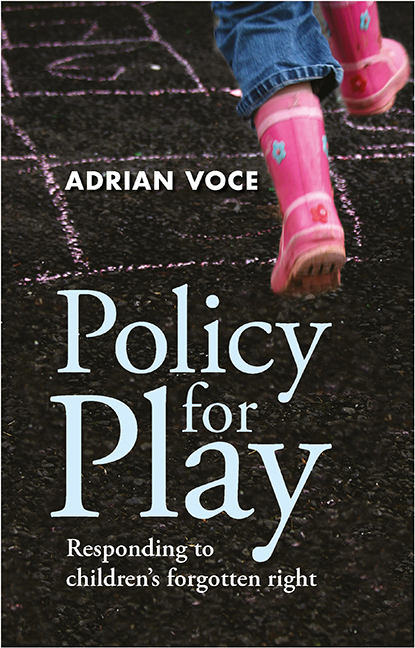Book contents
- Frontmatter
- Dedication
- Contents
- Who’s who
- About the author
- Preface
- Foreword
- Prologue
- Introduction ‘To respect, protect and fulfil’
- one ‘To play and to dream’ • Restoring play to the heart of the campaign for children’s rights
- two ‘For a change’ • Finding the evidence for play policy
- three ‘Advocates for play’ • Playwork’s place at the heart of the play movement
- four ‘New opportunities’ • Lottery funding and the beginnings of public play policy
- five ‘A vital and vibrant city’ • How devolved government in London set a benchmark for play policy
- six ‘Making the case’ • The call for a national play strategy
- seven ‘Things to do, places to go?’ • How play was overlooked by children’s services reform
- eight ‘Getting serious’ • The national play review
- nine ‘Lottery millions’ • The Children’s Play Initiative
- ten ‘Dirt is good’ • The Play England project
- eleven ‘The best place in the world’ • The Play Strategy for England
- twelve ‘Playbuilders’ • Breaking the mould of the public playground
- thirteen ‘Everyday adventures?’ • Austerity brings an end to play policy in England
- fourteen ‘Skylarks and canaries’ • The legacy of the Play Strategy
- fifteen ‘Children now’ • Responding to children’s right to play: conclusions and recommendations
- Epilogue
- References
- Index
six - ‘Making the case’ • The call for a national play strategy
Published online by Cambridge University Press: 08 March 2022
- Frontmatter
- Dedication
- Contents
- Who’s who
- About the author
- Preface
- Foreword
- Prologue
- Introduction ‘To respect, protect and fulfil’
- one ‘To play and to dream’ • Restoring play to the heart of the campaign for children’s rights
- two ‘For a change’ • Finding the evidence for play policy
- three ‘Advocates for play’ • Playwork’s place at the heart of the play movement
- four ‘New opportunities’ • Lottery funding and the beginnings of public play policy
- five ‘A vital and vibrant city’ • How devolved government in London set a benchmark for play policy
- six ‘Making the case’ • The call for a national play strategy
- seven ‘Things to do, places to go?’ • How play was overlooked by children’s services reform
- eight ‘Getting serious’ • The national play review
- nine ‘Lottery millions’ • The Children’s Play Initiative
- ten ‘Dirt is good’ • The Play England project
- eleven ‘The best place in the world’ • The Play Strategy for England
- twelve ‘Playbuilders’ • Breaking the mould of the public playground
- thirteen ‘Everyday adventures?’ • Austerity brings an end to play policy in England
- fourteen ‘Skylarks and canaries’ • The legacy of the Play Strategy
- fifteen ‘Children now’ • Responding to children’s right to play: conclusions and recommendations
- Epilogue
- References
- Index
Summary
By a coincidence of government restructuring, the department with responsibility for the National Lottery under the New Labour government of 1997 was also the one that had contracted CPC to deliver a small policy and research programme (HM Treasury, 2003). The Department for Culture, Media and Sport (DCMS) had inherited such responsibility for children’s play as there was at that time within Whitehall from one of its predecessors, the Department for National Heritage.
There were two main problems with play policy residing at the DCMS. First, this placed it outside of the main locus for child policy – the Department for Education and Employment – which, especially under New labour, was to very explicitly broaden its reach and ambition to drive up improvements in every area of children’s lives touched by public services or the public realm (HM Treasury, 2003). Second, it simply did not have the budget to promise any substantial changes to an area of public life as universal as children’s play. It was an ‘arm’s length’ funder of the arts and sport, and also managed the government’s relationship with the BBC.
Nevertheless, the DCMS is where play policy resided. Fortunately, the department also had two saving graces as far as the play movement was concerned. The first of these was that the lottery distributors were accountable to it, and to some degree took their policy direction from it – especially in the case of NOF (see Chapter Four). The second was Culture Secretary, Chris Smith.
A couple of years before the CPC meeting with NOF, in October 1998, the Secretary of State was invited to speak at London Play’s first annual meeting. As an Islington MP renowned for his support of local action, the minister was a long-term friend of the Islington Play Association and the 12 adventure playgrounds in the Borough. He accepted our invitation and the event was a huge success, sending out a message that the ‘new kid on the block’ in London meant business (and so impressing our funding officer from London Boroughs Grants that he immediately took us off the ‘high-risk’ category!).
- Type
- Chapter
- Information
- Policy for PlayResponding to Children's Forgotten Right, pp. 63 - 70Publisher: Bristol University PressPrint publication year: 2015



